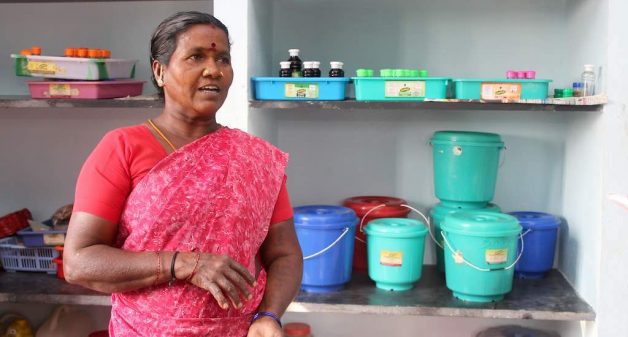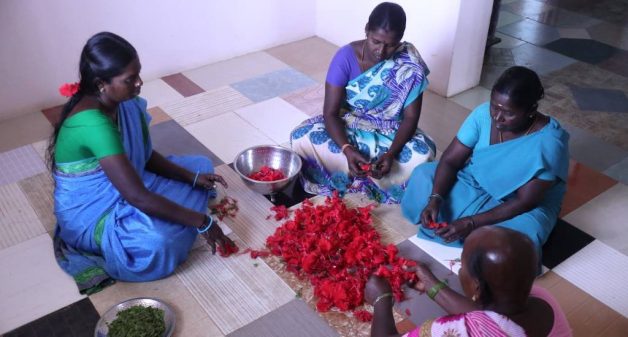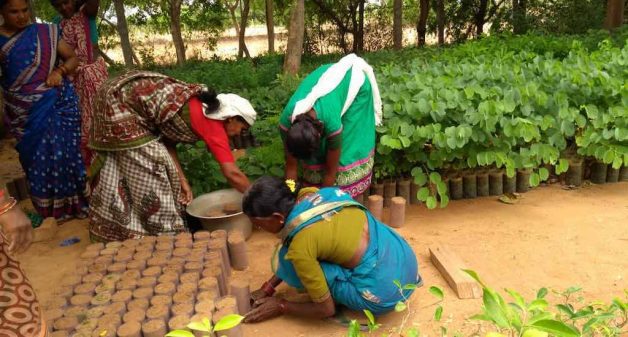
Tamil women bank on herbs to boost income
Women in rural Villupuram have quit working as farm labor and have become herbal entrepreneurs to conserve traditional knowledge, revive use of healthy herbs and boost household incomes

Women in rural Villupuram have quit working as farm labor and have become herbal entrepreneurs to conserve traditional knowledge, revive use of healthy herbs and boost household incomes
Parvathy N., the owner of Sri Siddha Forest Herbals In Auroville, Puducherry, was busy recommending herbal remedies to a customer who had joint pains. “There is a Tamil saying, unavae marundhu (food is medicine). And that’s what we do here. We believe that we can find simple solutions to many modern-day health issues in our own kitchen,” she said, after recommending herbs to a few more customers.
She sells herbs like nilavembu that is used to treat dengue, vetiver and aswagantha. The other stocks include herbal products like chutneys, spreads, and dosa flour to pain-relief oils and herbal beauty products. An expert in native healing system, she conducts herbal food workshops in the nearby Pitchandikulam forest, a bio-resource center and ethno-medical forest.
Most of the products in her shop are made by women self-help groups in Nadukuppam and Vandipalayam villages in Villupuram district. Rural women from the district, most of whom used to work as agricultural labor, sell herbs and herbal products in nearby Puducherry, in an effort to make a living by preserving traditional knowledge.
Healing herbs
Parvathy, a native of Nallur village in Villupuram district, could not attend school till the age of seven, due to a skin disease. “It was my grandmother and father, both traditional healers, who found a remedy for my condition,” she told VillageSquare.in, showing the marks in her hands. “Treated with an oil made from barks of trees like neem and pongam, my boils vanished.”
“Back then, in villages like ours, we relied on traditional healers to handle minor health issues like insect bites, skin problems, cold, etc.,” she said. She still remembers how a fungal infection called the dhobi’s itch was spreading fast in her neighborhood and how her grandmother helped control it using a local herb.
Even as a child, Parvathy used to hunt for herbs with her father and grandmother and try her own formulations for hair fall, hair growth and so on. She then moved on to do her master’s in human rights, but was called to Pitchandikulam forest to work as a herbal health worker.
Women’s federation
At Pitchandikulam, she had the chance to work with several traditional healers and document their knowledge in the form of a book. “We recorded around 40 formulations. Now, we are trying to bring at least 20 of these formulations back to use,” she said.

As founder-mentor of Kaluveli Sustainable Livelihood Women Federation, not only has she found a platform for herself but has also helped women farm laborers from neighboring villages to become herbal entrepreneurs. The federation runs three herbal enterprises, namely, Meera Herbal Foods, Amirtha Herbals and Annai Nursery.
Herbs as food
“This is knowledge about locally available herbs that we have known for generations,” said Vennila (45). According to Parvathy, these local herbs were part of regular menu that even villagers have now forgotten. “We are trying to bring back the treasures in our own backyard,” said Parvathy.
“I have sold products worth Rs 6oo today,” Venilla (45) said with pride, while on her way to Meera Herbal Foods in Vandipalayam village. She had spent half the day making pirandai chutney, traditionally used to treat gastritis and heal broken bones, and hence could go only to two villages.
“All the team members at Meera Herbal Foods are trained to work end-to-end,” Venilla told VillageSquare.in. From foraging for herbs in nearby forests and gardens, to cooking herbal products and selling them directly to customers, each member takes turns to perform various roles in this enterprise that sells herbal foods.
Availability
The women know where to find each of the herbs. “For instance, we look for neelibringadi near Kariyam pond, thoothuvalai in the bunds of Adasal village, vepaalam and veppam poo in the Nadukuppam forest and so on,” she said.
Apart from scouring nearby forests, the women use their own gardens to source raw materials and also buy some herbs from Annai Nursery, which is at a walking distance. They did a baseline survey in the neighboring six villages to map the herbs in their locality.
Sale of saplings
Annai Nursery in Nadukuppam, with 18 members, is another successful enterprise run by rural women, where they grow herbal and medicinal plants. They save seeds and grow saplings based on the season.
K Selvi (44) has been working here for four years, “We have over 40 varieties of herbs here, from the famous lemongrass, and tulsi to the lesser-known elumbotti (Ferula asafetida that improves digestion),” she told VillageSquare.in.

“We have even state forest departments among our customers,” said Selvi. The women put up stalls and sell saplings at exhibitions in Chennai. They supplied saplings to the Adyar Poonga eco-restoration project at Chennai and are now working on a 4-acre private medicinal garden for a client.
Better prospects
Amirtha Herbals in Nadukuppam village is a center for herbal remedies and beauty products. A group of women was cleaning dried hibiscus flowers, that would later be used for preparing hair oil. Mallika (43), who used to work as a farm laborer, said the income from farming was unstable. She has been a part of the Amirtha team for four years.
“But here, we are the ones who run Amirtha. We take home a fixed salary of Rs 3,000 and save the rest in our bank accounts for further investment and our personal use,” Mallika told VillageSquare.in. “Being illiterate, I never thought I would be running a business in my own village one day.”
By locals, for locals
Thanks to increasing awareness on Indian herbs and native healing systems like Siddha, the demand for natural, herbal products has shot up. Natural personal care products in India contribute a whopping 41% to the personal care segment.
“We do not want it to be another organic product that people here cannot afford,” said Parvathy, shunning export prospects. “Our aim is to bring the local herbs back into use, as much as it is to run a self-sustainable business.”
By evening, the women who had gone out to sell their products in nearby villages returned back, even as Kumutha amma who was working at the unit finished packing the spirulina idli podi, and stored the balance powder to start packing the next day.
“All three projects work on a similar business model where the women take all the business decisions,” said Parvathy. For women like Parvathy and Venilla, it is as much about preserving traditional knowledge, of recipes and remedies passed on orally by generations, as it is about being financially independent.
Catherine Gilon is a journalist based at Chennai. Views are personal.